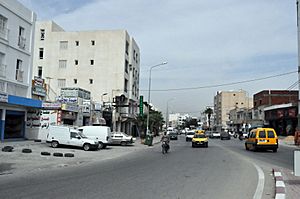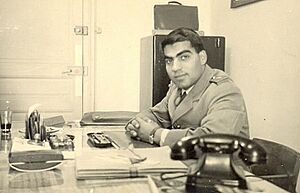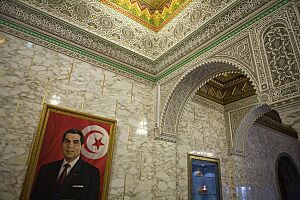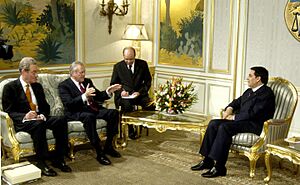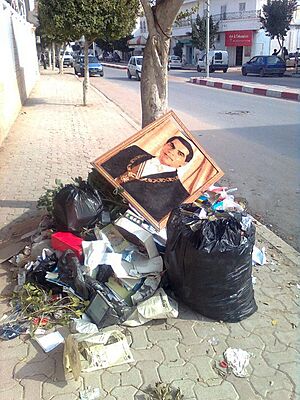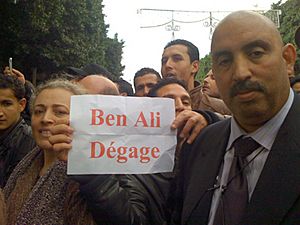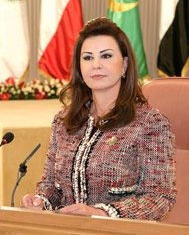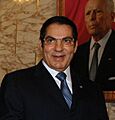Zine El Abidine Ben Ali facts for kids
Quick facts for kids
Zine El Abidine Ben Ali
|
|
|---|---|
| زين العابدين بن علي | |
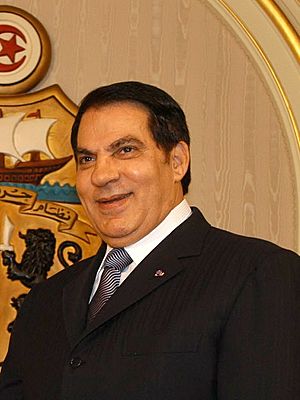
Ben Ali in November 2008
|
|
| President of Tunisia | |
| In office 7 November 1987 – 14 January 2011 |
|
| Prime Minister | Hédi Baccouche Hamed Karoui Mohamed Ghannouchi |
| Preceded by | Habib Bourguiba |
| Succeeded by | Mohamed Ghannouchi |
| Prime Minister of Tunisia | |
| In office 2 October 1987 – 7 November 1987 |
|
| President | Habib Bourguiba |
| Preceded by | Rachid Sfar |
| Succeeded by | Hédi Baccouche |
| Personal details | |
| Born | 3 September 1936 Hammam Sousse, French Tunisia |
| Died | 19 September 2019 (aged 83) Jeddah, Saudi Arabia |
| Resting place | Al-Baqi Cemetery, Medina, Saudi Arabia |
| Political party | Socialist Destourian Party (1986–1988) Constitutional Democratic Rally (1988–2011) |
| Spouses |
Naïma Kefi
(m. 1964; div. 1988)Leila Trabelsi
(m. 1992) |
| Children | Ghazoua (born 1963) Dorsaf (born 1965) Cyrine (born 1971) Nesrine (born 1987) Halima (born 1992) Mohamed Zine El Abidine (born 2005) |
| Alma mater | Special Military School of Saint Cyr School of Applied Artillery Senior Intelligence School in Maryland School for Anti-Aircraft Field Artillery in Texas |
| Religion | Sunni Islam |
| Full name | Zine El Abidine Ben Haj Hamda Ben Haj Hassen Ben Ali |
| Military career | |
| Allegiance | |
| Service/ |
|
| Years of service | 1958–1980 |
| Rank | Brigadier general |
Zine El Abidine Ben Ali (Arabic: زين العابدين بن علي; 3 September 1936 – 19 September 2019), often called Ben Ali, was a Tunisian politician. He served as the second President of Tunisia from 1987 to 2011. During the Tunisian Revolution in 2011, he left Tunisia and went to Saudi Arabia.
Ben Ali became Prime Minister in October 1987. He then became president on 7 November 1987. This happened after President Habib Bourguiba was declared unable to continue his duties. Ben Ali was re-elected many times, often with more than 90% of the votes. His last re-election was in October 2009.
On 14 January 2011, after a month of protests, he fled to Saudi Arabia with his wife Leïla Ben Ali and their children. The new Tunisian government asked Interpol to issue an international arrest warrant for him. He was accused of taking money out of the country illegally. A Tunisian court later sentenced him and his wife to prison in their absence. He died in Jeddah, Saudi Arabia, on 19 September 2019, at the age of 83.
Contents
Early Life and Military Career
Zine El Abidine Ben Ali was born in 1936 in Hammam Sousse, Tunisia. He was the fourth of eleven children. His father worked as a guard at the port of Sousse.
As a young man, Ben Ali joined the local resistance against French rule and was put in prison. He did not finish high school. In 1958, he joined the new Tunisian Army. He was chosen for military training in France and the United States. He studied at the École Spéciale Militaire de Saint-Cyr in France. He also trained at intelligence schools in Maryland and Texas in the US.
After his training, he returned to Tunisia in 1964. He started his military career as a staff officer. He helped create and lead the Military Security Department for ten years. He also worked as a military representative in Tunisian embassies in Morocco and Spain. In 1977, he became the General Director of National Security.
In 1980, Ben Ali became Tunisia's ambassador to Poland for four years. After the "bread riots" in 1984, he was again made director-general of national security. He later served as Minister of the Interior. In October 1987, President Habib Bourguiba appointed him Prime Minister.
Becoming President of Tunisia
On 7 November 1987, doctors said that President Bourguiba was too sick to be president. Ben Ali, who was next in line, then became president. This day was celebrated every year in Tunisia as "New Era Day." Ben Ali's rise to power followed Article 57 of the Tunisian Constitution.
At that time, Tunisia faced economic challenges. The country had high inflation and a lot of foreign debt. Ben Ali's government aimed to improve the economy.
Ben Ali's Presidency (1987-2011)
Changes in Politics
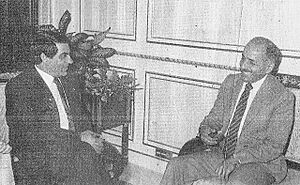
When Ben Ali first became president, he promised to make Tunisia more democratic. He allowed state newspapers to publish statements from opposition groups. In 1988, he changed the name of the ruling party to the Democratic Constitutional Rally (RCD). He also made changes to the constitution. These changes limited the president to three five-year terms.
However, the elections in 1989 were not very different from past ones. Ben Ali's party won almost all seats in the legislature. He was the only candidate for president. This was because other candidates found it hard to get enough support to run. Over time, some old restrictions returned. The press faced more official censorship.
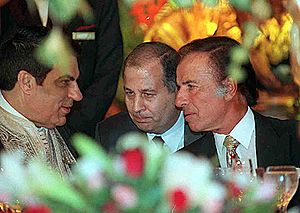
In the 1994 elections, opposition parties won some seats in Parliament for the first time. Ben Ali ran for a second term without opposition and won by a very high margin. In 1999, he faced an opponent for the first time but still won with a very high percentage of votes.
In 2002, a national vote changed the constitution. It created a two-chamber parliament. It also allowed the president to run for an unlimited number of terms. This change allowed Ben Ali to stay in office beyond 2004. He was re-elected in 2004 with another very high vote percentage.
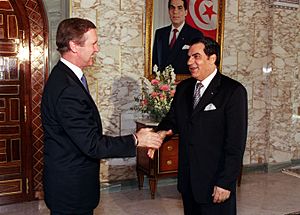
During Ben Ali's rule, there were concerns about human rights. Groups like Amnesty International criticized Tunisia for not respecting political rights. They also noted problems with freedom of the press. By the early 2000s, many saw Ben Ali's government as very strict.
In October 2009, Ben Ali was re-elected for a fifth term. The African Union sent observers who called the election "free and fair." However, the US State Department noted that Tunisia had not allowed international observers to monitor the election.
In late 2010 and early 2011, protests began over unemployment. These protests grew into a large movement against Ben Ali's government. On 13 January 2011, he said he would not run for another term in 2014. He also promised economic improvements and more press freedom. But the next day, thousands protested, demanding he resign immediately.
Economic Progress
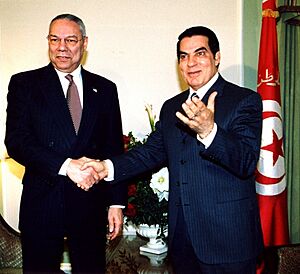
As president, Ben Ali made economic changes that helped Tunisia grow. The country saw more foreign investment. The average income per person more than tripled from 1986 to 2008. Even with a slowdown in 2002, growth picked up after 2003. For about 20 years, the economy grew by nearly 5% each year.
Tunisia had good trade relations with the European Union. Its tourism industry also improved. The country was ranked high in global competitiveness reports.
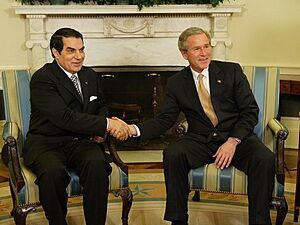
Ben Ali's government also worked to reduce poverty. The National Solidarity Fund helped lower the poverty rate from 7.4% in 1990 to 3.8% in 2005. This fund aimed to help people in poor areas.
However, Tunisia still had high unemployment, especially among young people. Many rural and urban poor did not benefit from the economic growth. These issues, along with limits on free speech, led to the Tunisian Revolution.
Foreign Relations
During Ben Ali's time as president, Tunisia followed a moderate foreign policy. It supported peaceful solutions to conflicts, especially in the Middle East and Africa. Tunisia hosted early talks between Palestinians and Americans. It also supported the Palestinian cause.
Tunisia called for international efforts against terrorism. It was a key partner with the US in fighting global terrorism. Ben Ali also worked to promote cooperation among nations. He helped create the United Nations World Solidarity Fund to fight poverty. He also played a role in the UN declaring 2010 as the International Year of Youth.
Leaving the Presidency
In response to the protests, Ben Ali declared a state of emergency. He dissolved the government on 14 January 2011. He promised new elections within six months. However, things changed quickly. The army and key lawmakers seemed to lose trust in Ben Ali.
As his power weakened, Prime Minister Mohamed Ghannouchi announced he would temporarily lead the country. Ben Ali and his family quickly left for Laouina airport. His plane was allowed to take off, and then Tunisian airspace was closed. The presidential plane flew to Jeddah, Saudi Arabia. King Abdullah of Saudi Arabia allowed Ben Ali and his family to live there. They had to agree to stay out of politics.
Other family members who tried to leave were stopped by the army at the airport.
Confusion Over Leadership
Around 6 PM on January 14, Prime Minister Ghannouchi announced on TV that he would temporarily take over as head of state. This was because the president was "temporarily unable" to do his job.
However, this arrangement did not last long. The next day, the Constitutional Council of Tunisia said that the presidency was actually empty. They said Ben Ali's arrangements before leaving were against the constitution. Fouad Mebazaa, the Speaker of Parliament, was then appointed acting president. Mebazaa took an oath to respect the constitution. It was also announced that new elections would be held within 45 to 60 days.
Life in Exile and Legal Actions
On 26 January 2011, the Tunisian government issued an international arrest warrant for Ben Ali. They accused him of illegally taking money and property out of the country. Videos showed cash and jewelry hidden in the presidential palace. The Swiss government also froze millions of dollars in bank accounts held by his family. On 28 January 2011, Interpol issued an arrest warrant for Ben Ali and six family members, including his wife.
Ben Ali and his wife were tried in absentia (meaning they were not present) for their suspected involvement in some of Tunisia's largest businesses. On 20 June 2011, they were found guilty of theft and unlawful possession of money and jewelry. They were sentenced to 35 years in prison. They also had to pay a large fine. Ben Ali's lawyer called the verdict a "joke." Saudi Arabia did not send them back to Tunisia.
In November 2016, Ben Ali released a statement through his lawyer. He admitted that his government made "errors, abuses and violations." This statement came after public hearings by the Truth and Dignity Commission in Tunisia.
Family Life
Ben Ali and his family were accused of corruption. These accusations were a major reason for the 2010–2011 Tunisian protests that led to his government's fall. Many of his family members also fled Tunisia. On 20 January 2011, Tunisian TV reported that 33 of Ben Ali's family members had been arrested while trying to leave the country.
Leïla Ben Ali was his second wife. She led the Basma Association, which helped people with disabilities find jobs. She also served as president of the Arab Women Organization. Ben Ali had three children with Leila: Nesrine, Halima, and Mohamed Zine El Abidine. He also had three daughters from his first marriage: Ghazwa, Dorsaf, and Cyrine.
Health and Passing
On 17 February 2011, there were reports that Ben Ali had suffered a stroke and was in critical condition. However, his lawyer later stated that Ben Ali was in a "normal" state.
Ben Ali died at a hospital in Jeddah, Saudi Arabia, on 19 September 2019. He was 83 years old and had prostate cancer. He was buried on 21 September at the Al-Baqi Cemetery in Medina, Saudi Arabia.
Images for kids
See also
 In Spanish: Zine El Abidine Ben Ali para niños
In Spanish: Zine El Abidine Ben Ali para niños
- 18 October Coalition for Rights and Freedoms
Decorations
Tunisian national honours
- Grand Master of the Order of Independence
- Grand Master of the Order of the Republic
- Grand Master of the National Order of Merit
- Grand Master of the Order of the Seventh of November
Foreign honours
 Argentina: Grand Cross of Order of the Liberator General San Martín (1997)
Argentina: Grand Cross of Order of the Liberator General San Martín (1997) Austria : Grand Star of the Decoration of Honour for Services to the Republic of Austria (2003)
Austria : Grand Star of the Decoration of Honour for Services to the Republic of Austria (2003) Egypt : Collar of the Order of the Nile (1990)
Egypt : Collar of the Order of the Nile (1990) France : Grand Cross of the Order of the Legion of Honour (1989)
France : Grand Cross of the Order of the Legion of Honour (1989) Japan : Grand Cordon of the Order of the Chrysanthemum (1996)
Japan : Grand Cordon of the Order of the Chrysanthemum (1996) Libya : Collar of the Order of the Grand Conqueror (1992)
Libya : Collar of the Order of the Grand Conqueror (1992) Malta : Honorary Companions of Honour with Collar of the National Order of Merit (Malta) (2005)
Malta : Honorary Companions of Honour with Collar of the National Order of Merit (Malta) (2005) Monaco : Grand Cross of the Order of Saint-Charles (7 September 2006)
Monaco : Grand Cross of the Order of Saint-Charles (7 September 2006) Morocco : Grand Cross of the Order of Ouissam Alaouite (1987)
Morocco : Grand Cross of the Order of Ouissam Alaouite (1987) Palestine: Grand Collar of the State of Palestine (1996)
Palestine: Grand Collar of the State of Palestine (1996) Portugal: Grand Collar of the Order of Prince Henry (1995)
Portugal: Grand Collar of the Order of Prince Henry (1995) Romania : Collar of the Order of the Star of Romania (2003)
Romania : Collar of the Order of the Star of Romania (2003) South Africa : Grand Cross of the Order of Good Hope (5 April 1995)
South Africa : Grand Cross of the Order of Good Hope (5 April 1995) Spain : Collar of the Order of Isabella the Catholic (25 May 1991)
Spain : Collar of the Order of Isabella the Catholic (25 May 1991)
 | Kyle Baker |
 | Joseph Yoakum |
 | Laura Wheeler Waring |
 | Henry Ossawa Tanner |


